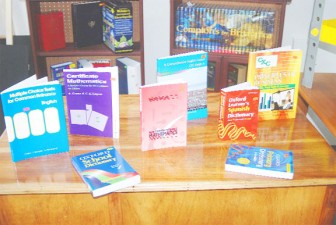The long-practiced scourge of illegal copying and distribution of published school texts may soon be engaging the attention of the court as overseas publishers, their agents in Georgetown and the few remaining local bookstores seek to launch a counter-offensive against pirates who have been operating with impunity for years.
Lloyd Austin, owner of Austin’s Bookstore, one of a few bookselling establishments that have survived the voracious piracy of school texts told Stabroek Business earlier this week that legal action is awaiting the acquisition of a Power of Attorney that will allow Cambridge, one of the publishers affected by the illegal copying of books to be enjoined with others. Pearson (Longman) Oxford, Heinemann, Nelson-Thorne and Cambridge are the overseas publishers affected by the illegal copying operations. A regional company which also publishes textbooks used by schools in Guyana, Caribbean Educational Publishers, is also being affected by the book piracy operations.
Austin told Stabroek Business that the publishers are working through a local attorney to secure an injunction restricting the illegal production of the texts, failing which action will be taken to secure the seizure of both the implements of production and stocks.

Austin told Stabroek Business that after years of illegal operations by “the pirates” he hoped the court would take “swift and decisive action to right this terrible wrong as soon as the matter engages it.” He said the practice had ravaged the local bookselling industry “and has left our overseas publishers exasperated and frustrated.” According to Austin, there was also a fair measure of embarrassment in the situation for Guyana since “sometimes you get the impression that the illegal operators are operating in a comfort zone arising out of a failure by the authorities to put any real pressure on them to cease their operations.”
Austin said suspicion that the state-run Book Distribution Unit may also be involved in illegally printed text books had added a further dimension of embarrassment to the issue. Late last year, he informed this newspaper that he had received information from a teacher at a state school that books that had been illegally copied had been delivered to that school by the Ministry of Education’s Book Distribution Unit. The matter was raised in a section of the media and Education Minister Shaik Baksh denied knowledge of the ministry’s involvement in the illegality and had promised to look into it. Several months later and despite three separate enquiries by this newspaper there has been no statement on his promised investigation. On the last occasion that Stabroek Business checked with the minister’s office staff there said that the investigation had been assigned to Permanent Secretary Phulander Kandai. Attempts to speak with him on the matter have proven futile.
Meanwhile, Austin told Stabroek Business that his own bookstore and Horizon Books, another local entity run by former State Planning Secretariat employee Bholan Budhoo continue to lose heavily as a result of the piracy. “Piracy has made the bookselling business an extremely difficult business pursuit. Speaking for myself I have had to cut my textbook orders, in some cases by as much as 75 per cent,” Austin said. Despite the continual increase in the school population, Austin said he estimated that the sale of legitimately published school texts may have more than halved over the past seven years. “It is the publishers who are making the money,” Austin declared.
Austin explained in the past he and other agents representing overseas publishers were contacted by the Education Ministry to discuss the importation of text books required for use in schools. “[We], along with Caribbean Education Publishers and others used to rely on information provided by the ministry to import text books. Again speaking for myself as the sole agent for Oxford, Nelson-Thorne, Heinemann and Ginn, I have not had such an engagement with the Ministry of Education in about five years,” Austin said.
Asked about possible action that overseas publishers might take if the legal initiative fails to bear fruit, Austin told Stabroek Business he was unsure as to what their next move might be. “What I can tell you is that they are doing their very best to keep business going,” he said.
And Austin told Stabroek Business that he was heartened by the posture of some privately-run schools that support the principle of discouraging the use of copied text books. “I can think of one private school in Georgetown, particularly whose principal has taken a strong stand against book piracy,” Austin told Stabroek Business.




